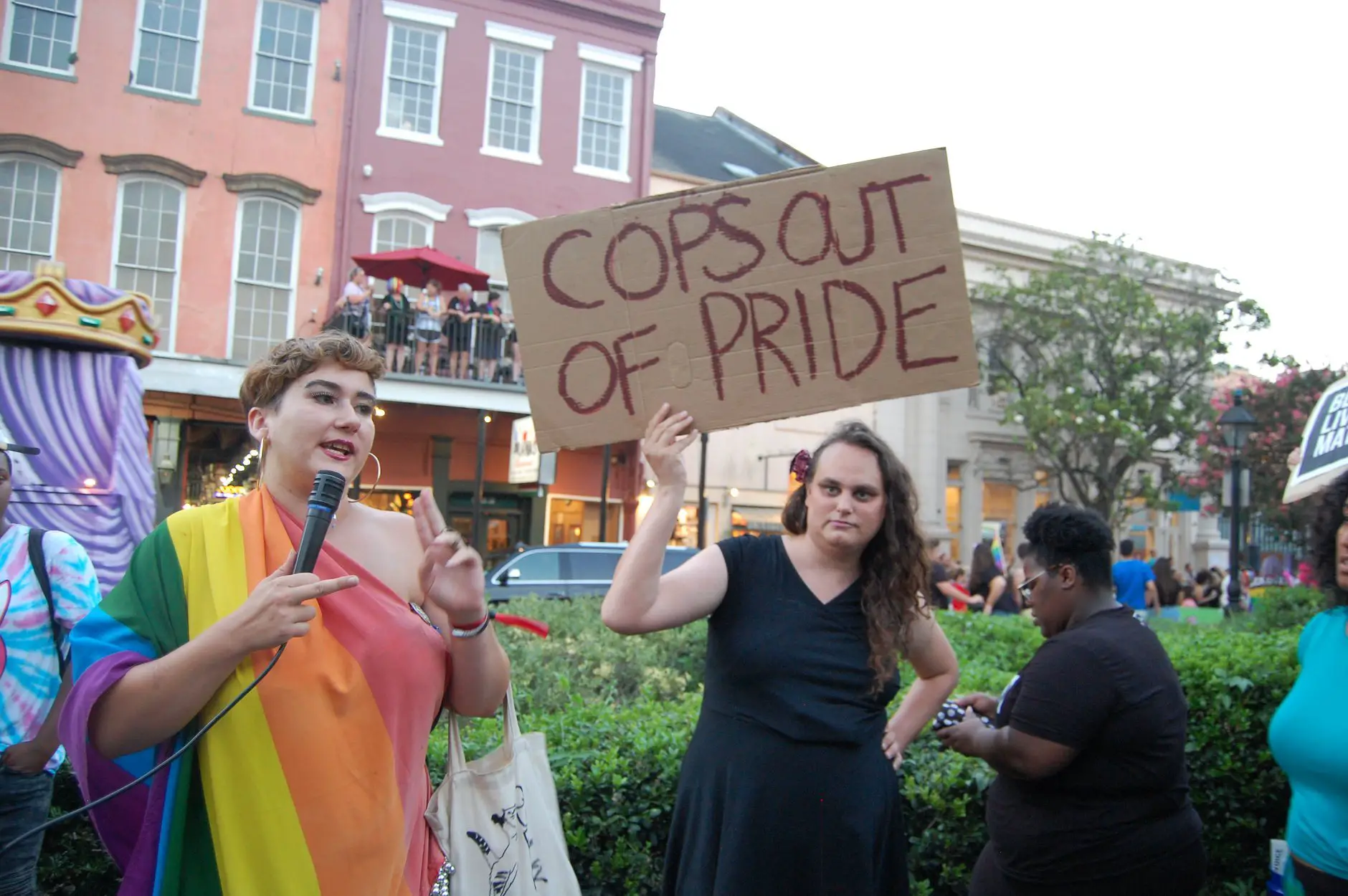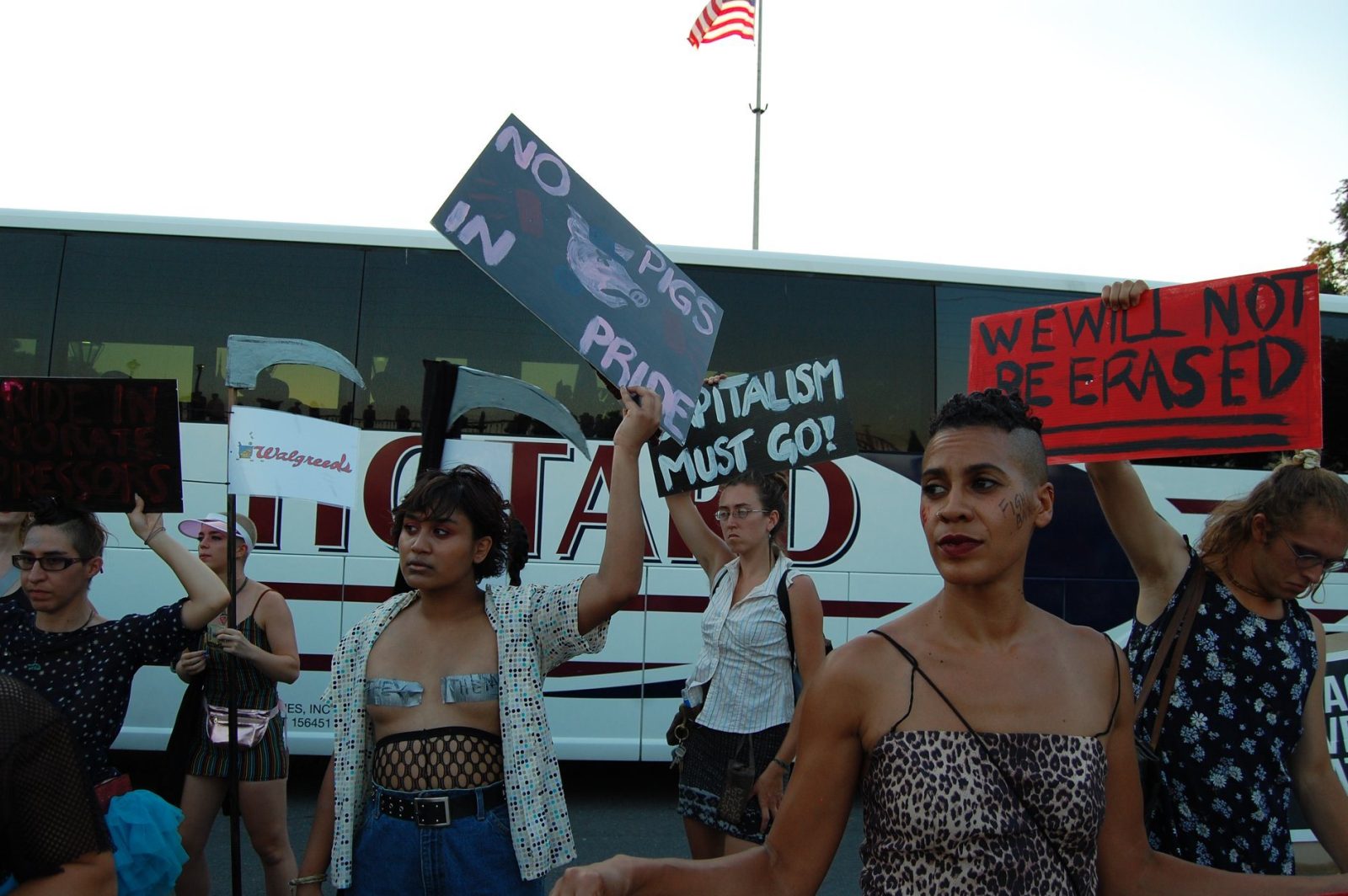
Painting the police as allies erases a history rooted in suppressing labor movements and minorities.
Last week, the New Orleans Police Department announced that it would allow their officers to wear a rainbow police badge, signifying allyship to the LGBTQIA+ communities. Highly publicized, the visible display is an example of “pinkwashing”—defined by Wictionary as “The practice of a state or company presenting itself as gay-friendly and progressive, in order to downplay their negative behavior.”
Pinkwashing is far easier for the city to pull off than it would be to actually address the needs of queer and trans people in New Orleans. Furthermore, many of the issues facing these communities are a direct result of over-policing.
Queer liberation will not be achieved until the rights of the most vulnerable members of the community are protected and respected—those who are poor, sex workers, undocumented, people of color, trans people, and importantly, people whose identities reflect some combination thereof. The police—including the NOPD, have consistently opposed, and perpetrated violence against, these communities.
To understand why the rainbow badges and the pinkwashing that they represent are antithetical to queer rights, it is useful to consider the origins of modern policing in the United States. Although police departments are ubiquitous in urban American life, police forces run by local governments are a relatively recent invention. In 1704, one of the first organized law enforcement teams was a slave patrol, organized by then-colony Carolina.
According to the University of Eastern Kentucky’s Department of Police Studies, the first formal American Police force was formed in Boston, in 1838. Other urban centers quickly followed suit with their own police forces. The goal of these new organizations was not to keep residents safe, but rather to “maintain order,” which meant criminalizing the activities of immigrants and other disenfranchised groups, and could also mean clashing with striking laborers.

Moving to the present, there is a smorgasbord of evidence that points to law enforcement’s ties with racist, misogynistic, transphobic and homophobic ideology. For instance, the FBI has repeatedly investigated white supremacists’ persistent presence within law enforcement organizations nationwide. Additionally, police officers perpetrate violence against their partners and families at rates that are at least 2-4 times higher than average, according to a report by the National Center for Women and Policing.
According to a nationwide survey of LGBTQIA+ people by the organization Lambda Legal, transgender people face high rates of harassment from police, while response to complaints of misconduct are brushed off. In New Orleans, sex workers are often harassed by police, and strip clubs have been the frequent targets of police raids. The NOPD also targets the homeless and transient population, though homeless youth are disproportionately likely to be LGBTQ+.
On a broader scale, according to data collected by The Guardian, black people were killed by police more than twice as often as whites (some sources say this discrepancy is even higher)—and there are five times more white people in the US than Black people. Young Black men are at the highest risk, making up 15 percent of all people murdered by police in 2015, though they are only two percent of the total population.
And of course, that’s not all.
In cases where cops kill people (1093 people were killed by police in 2016 according to The Guardian’s data), they are rarely convicted of murder. In many cases, they do not lose their jobs.
Consider the case of Charleena Lyles, a 30-year-old mother of four who called the police to report a burglary. She was shot seven times and by the officers who came to her home. One of the officers was suspended for two days without pay for a technical violation.
The ugly truth is that calling the police can mean taking your own life into your hands and risking the lives of people around you. And we need only look at the epidemic of violence against Black trans women to know that at the very least, police are utterly failing to keep those most at risk safe.
If the safety of only the white members of the LGBTQIA+ community are assured then there is neither safety nor justice for all.
What might a meaningful effort on the city’s part mean when it comes to policing and Black and queer communities? One example is a recent piece of legislation introduced in the city Counsel of Burlington, Vermont, which called for the termination of any officer found guilty of brutal or excessive force, expanded use of body cams, transparency during brutal/excessive force investigations, and would have capped Burlington’s police force at its present level, with the goal of slowly downsizing the police force and using the surplus funds to hire social workers. Progressive councilmember Jack Hanson says that the legislation was drafted in response to needs put forth by the local chapter of Black Lives Matter. Though the measure ultimately did not pass the city council, it represents an actual attempt at improving community safety.
If you accept that the institution of policing is intrinsically racist, that in many cases police officers perpetrate violence against the most vulnerable members of society, what does it look like when your local police force dons rainbow badges?
To me, it looks like an insult to my intelligence.
Jesse Lu Baum is a queer writer and cartoonist originally from Brooklyn, New York. Her writing has been featured in publications such as Medium.com, The Jewish Daily Forward, The Mid-City Messenger and Preservation in Print. Aside from writing, she has also worked as a non-profit home repair person, a theater bartender, and a research assistant.










xxxhdfire.com melissa moore riding big black cock.
I couldn’t agree more. It makes me so angry when white liberals sigh and say “well this is how things are” or “but we have to compromise”…. so what should we compromise on? If your pride isn’t intersectional you shouldn’t be proud.
Great article.